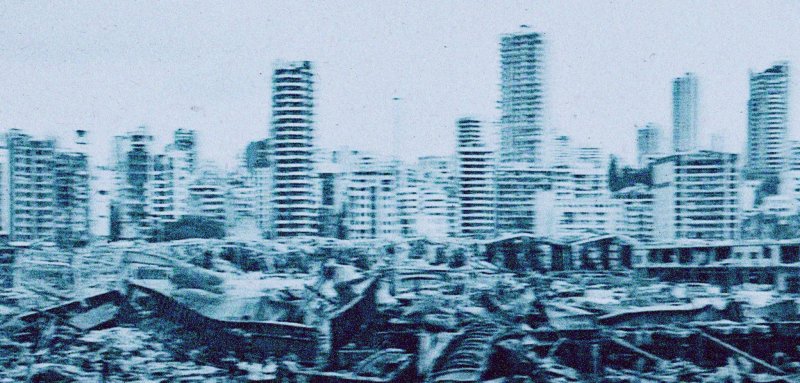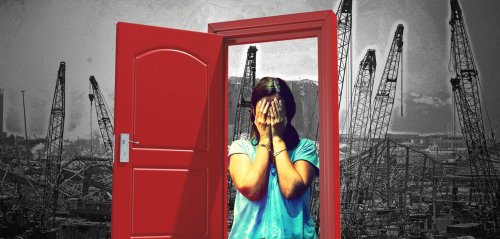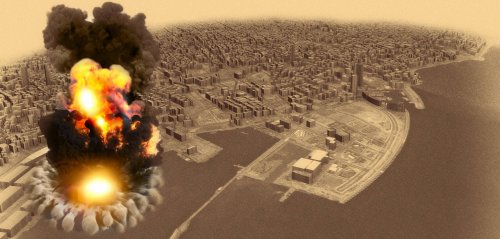For those that survived the blast of August 4, picking up the pieces of their lives has been a slow and daunting process. Filled with despair and anguish, survivors still find coping difficult and painful. For some, this has meant growing angry and directing their rage at those responsible. For others it’s a call to rebuild and coalesce around their collective suffering. Regardless, most cannot escape the crippling and depressing effects of trauma.
The sheer size of the blast shook the very basis of reality; the totalizing shift in perspective is evident when people speak of pre and post-blast Beirut: saying things like: “before the blast I never thought about emigrating, but now I have no other choice”. Speaking to survivors, the blast’s effects are not just a thing of the past, it’s a new reality they live on a daily basis.
These feelings have been much more difficult to deal with simply because they are so incoherent. Some have a loose conception that what they’re experiencing is in fact trauma, but are still unable to overcome it. Understanding the psychology behind trauma may alleviate people’s confusion and suffering while providing ways of dealing with its symptoms, but doing so may also expose the limitations of psychopathology and the complexity of our situation more generally.
One way people have been coping is by writing about their experience. Reading articles about personal experiences during and after the blast is certainly helpful, not only because it contextualizes the reader’s own trauma but also because it develops this sense of collective despair. Feeling connected to others is essential after such a traumatic event dominates our lives. Trauma, and mental illness associated with it, can be suffocating, stripping people of their sense of agency and often causing feelings of isolation and distrust, even if the incident had affected numerous others. By sharing their experiences, writers tacitly lend their support and confirm that the readers are not alone.
What people are feeling is so difficult to express. It’s a coagulated mess of thoughts and emotions that betray the inability of language to describe the truly surreal and absurd experience of living in Beirut
In Nasri Atallah’s “Inside Beirut’s Broken Heart”, the author painstakingly details his experience on the day of the blast. The article captures a totally ordinary day that is horrifically transformed, with only sheer luck as an improbable saviour. What sets this piece apart from others is that, where others end with a call for revenge, Nasri’s ends with a different task ahead: “The language around our collective trauma is still emerging... But we don’t know how to talk about this yet.” It’s in this spirit that I wanted to explore this new language and hopefully alleviate at least some of the unintelligible suffering we’re all feeling.
Everyone I know is traumatized by the blast in some shape or form, whether it’s disturbed sleep, flashbacks, dissociating, avoiding, being triggered by sounds and images, an inability to think about the future, a lack of any hope or excitement. This list is almost as extensive as the list of ways people have been coping with these malignant symptoms, ranging from distractions to planning their own emigration. All of the things people have been reporting are typical reactions to traumatic incidents.
“Something as big as the explosion usually triggers something called an Acute Stress Response,” says Dania Darwish, a licensed clinical psychologist and certified professional coach. “Usually these symptoms wane over time, but according to the DSM (Diagnostic and Statistical Manual), if they stay for longer than a month, then the person has developed PTSD (Post-Traumatic Stress Disorder)”.
Trauma as a psychopathological category also provides people with a potential avenue for recovery. One of the most popular approaches to combat trauma is what’s known as EMDR (Eye Movement Desensitization and Reprocessing therapy), wherein patients would recall their experiences while moving their eyes left to right, triggering both hemispheres of the brain. “Through eye-movements, patients can become desensitized to what happened to them” Darwish says. “Our natural healing mechanism happens at night, during REM-sleep (Rapid Eye Movement). EMDR simply kickstarts that process”.
EMDR may sound bizarre but it has been shown to work in reducing symptoms of trauma, which is why it’s called an evidence-based treatment. Darwish, who has been offering free group EMDR sessions, has remarked that patients often experience drastic reduction in symptoms after only one session.
The symptoms of Acute Stress Disorder or PTSD are eerily familiar, they cut right to the core of what is currently being experienced. What people are feeling is so difficult to express. It’s a coagulated mess of thoughts and emotions that betray the inability of language to describe the truly surreal and absurd experience of living in Beirut.
Understanding trauma as a psychological category can provide language to the indescribable. It was only after I researched trauma that I understood why I wasn’t at all excited when a dear friend told me he’d be visiting Lebanon. I realized that I, in fact, could no longer conceive of the near future, that my sense of time had totally been warped. At the time I was painfully confused about why I had felt so apathetic, but when I discovered a concept called a ‘foreshortened future’, it all became plainly clear what I was experiencing. In short, since traumatic incidents are wholly unplanned (no one knew it was going to happen), survivors often can no longer trust the world or the future. All the logic of everyday life becomes invalid, bleached by the horrors of that day. I couldn’t predict the blast, so how can I predict or plan anything else? Being unable to trust that the future is inevitability, we are stuck in the realm of the past. Some have described this as feeling a part of them has died, or as American psychologist Judith Herman puts it: “when trust is lost, traumatized people feel that they belong more to the dead than to the living”.
Categorizing my experience made my suffering more coherent and easier to deal with. This psychological research helped alleviate my symptoms, but, perhaps unsurprisingly, it did little to help me understand the larger, external causes for my despair. The criticism of the apolitical and individualistic nature of psychopathology has a long history. With its emphasis on individual causation, and reflexive turn towards individual therapies, psychologists often ignore the true extent in which things like economics, society and hierarchies of power affect people’s mental well-being.
“The entire industry of psychiatry in Lebanon is very individualistic,” says Farah Baba, political activist and psychology graduate. “Oftentimes the balance between the individual and their material conditions is lost”.
“Psychotherapists often approach treatment by asking “how can I help you help yourself?”. It’s a very neoliberal approach”, Baba continued. “They fall so deep into this culture of self-care while neglecting community care or collective forms of healing. The link between the individual and the collective level is lost.”
Baba’s distrust in psychopathology’s ability to mend people’s emotional wounds is grounded in its inability to address those wounds’ real causes. If a person can't afford food for their family and, as a result, are suffering from anxiety, psychology might provide techniques to quell that anxiety in the short term but it will not deal with the source of the anxiety--poverty. By centering the discussion around individuals’ neurology or neuro-chemistry, psychologists are left unequipped to address other aspects of people’s lives, especially the unjust hierarchies they face. Baba puts it succinctly when she states: “Most therapies are concerned with helping people cope with the situation instead of helping them try to change the situation to be more just”.
This is the central dilemma of our current struggle: how do we overcome a national trauma whose pain we don’t want to forget?
The situation people in Beirut are living in now directly speaks to this criticism. The source of the trauma, the blast, was not an accident. It was a product of criminal actions and callousness by warlords whose collective rule the Lebanese have been trying to overthrow since October 17. Many have been saying that they don’t want to forget what happened and simply move on. Instead they want to harness that rage and exert it onto the perpetrators of the deadly crime that has left them broken and traumatized.
“It feels like our psychological well-being is tied to justice for what happened to us,” Baba states, “And not just accountability, but real justice.”
This sentiment is certainly widespread. The noose made its first appearance during the protests of August 8, but is now impossible to avoid. Nooses hang over bridges, on balconies, plastered in stencil on walls, while ‘Hang the nooses' was trended on Lebansese twitter. Protestors even made effigies of members of the political elite and placed them in makeshift gallows (one such effigy of the president was set on fire on top of the cement barriers set up to block access to parliament). It’s clear public sentiment has shifted.
The first step of recovery from trauma is acknowledging what happened and recognizing a desire to overcome it. However, if people resist seeking treatment, in fear of diluting their rage and allowing the current power structures to remain, then that places them at direct odds with their individual recovery. This is the central dilemma of our current struggle: how do we overcome a national trauma whose pain we don’t want to forget?
Combining the two may be found in community activism. Taking part in the clean up and rebuilding efforts has been a source of catharsis for many; it not only restored people’s agency but also developed a sense of hope through community. What people are rebuilding isn’t just the ruins of a city, but a collective commitment to one another. Although this is true, we shouldn’t lose track of our own personal well-being, or as Darwish states “If we want to create change, we have to first be strong enough”.
Yet the wounds of the blast, both physical and emotional, are still open. Every other day, a new finger is twisted into it, ensuring its effects don’t wear off. Every day I hear a loud noise outside and think, “there it is, the first blast that will signal the new war”.
Unconsciously, I play back the sound of the blast in my head at night. Even though it keeps me up and, it feels like a necessary, albeit self-destructive, exercise. I can’t help but agree with the now popular phrase “We don’t want to forget”. Not only do we not want to, we can’t. Every day something new happens that triggers an already traumatized population, whether it’s a long search and rescue operation in Gemmayze, French fighter jets cutting through the sky or a new massive fire burning in the very same port. The trauma is still present. Yet, a balance must be struck between individual care and pursuit of justice, otherwise we risk burning ourselves out.
Violence is the language of our political elite. Violence is how they reached their positions of power, but trauma is also how they’ve maintained it. It’s a tool of oppression, a form of internalized violence that crushes your resolve for life (let alone to organize and revolt). The use of trauma as a tool of domination and control is never more evident than when members of the political elite use the memory of the civil war (their war) to frighten and undermine us. Summoning the memory of checkpoints, for instance, isn’t an act of violence in itself. Rather, it triggers the traumas of those memories. It’s effects are similar: to demoralize, undermine and alienate a population and force them into submission.
It is clear that not only our mental health but our very survival hinges on justice and political change. Given the scale of the problem’s the Lebanese face, any individualistic intervention will be sorely unequipped to address their broader issues. A sense of collective closure is needed, but what that closure will materially look like or how it can actually be achieved is still to be determined. Without closure, our wounds won’t heal and those who caused them will continue to pry them open whenever they wish.
As Malcolm X famously proclaimed: “If you stick a knife in my back nine inches and pull it out six inches, there's no progress. If you pull it all the way out that's not progress. Progress is healing the wound that the blow made. And they haven't even pulled the knife out, much less heal the wound.” The “they” he uses refers explicitly to white supremacists, but in our context Malcolm X could just as easily be describing the Lebanese political elite.
We need to deal with our trauma in a way that deprives the elite of one of their most potent tools of oppression and psychological warfare. But the way we deal with it cannot be private, it must be collective. We must envision how the struggle to change the state can merge with the struggle to save ourselves, to improve our health. The same way that rebuilding the city was a collective action that improved our mental health, the revolution must do the same. The revolution must change the state and allow us to heal our communities at the same time.
Raseef22 is a not for profit entity. Our focus is on quality journalism. Every contribution to the NasRaseef membership goes directly towards journalism production. We stand independent, not accepting corporate sponsorships, sponsored content or political funding.
Support our mission to keep Raseef22 available to all readers by clicking here!
Interested in writing with us? Check our pitch process here!








